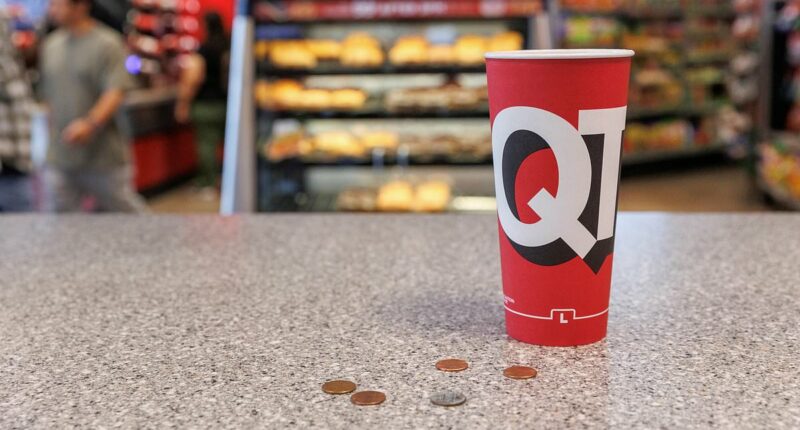Share this @internewscast.com
As the once-ubiquitous penny begins to vanish from American tills, major retailers nationwide are resorting to increasingly drastic measures to adjust to this change. With the US Mint having placed its final order for pennies in May, President Trump labeled the coin’s production a misuse of the country’s budget, signaling the end of an era that spanned over two centuries.
While the Treasury Department foresaw potential penny shortages by early 2026, the impact is already being felt in stores. Household names like McDonald’s, Burger King, and Sheetz are being compelled to rethink their cash handling processes, prompting a shift in how customers make transactions.
In response, some retailers have instructed employees to perform quick calculations, rounding purchases to the nearest nickel to facilitate smoother transactions. Others are adopting new company-wide policies to adapt to the dwindling supply of pennies.
Beyond adjusting cash handling procedures, several businesses are encouraging customers to opt for cashless payment methods. Some are even incentivizing the return of spare pennies by offering complimentary drinks, underscoring the creative strategies at play as the penny nears its final chapter in American commerce.
Some stores are having workers do quick math to round purchases up or down to the nearest nickel, while others are implementing new company-wide rules.
Others are encouraging customers to use cashless options, or offering free drinks in exchange for handing in spare pennies.
Trade groups are now sounding the alarm about just how much these cents add up, and how much stores could stand to lose without any guidance.
The National Association of Convenience Stores (NACS) estimates that rounding down would cost the industry about $1.2 million a day.

After more than two centuries in circulation, the US Mint officially stopped making pennies in May, and Americans are beginning to see shortages

President Trump said the production of pennies was a ‘waste’ of the nation’s budget
‘The thing that convenience stores most want is clarity from a federal level on how to address this, because right now there is not sufficient clarity,’ Jeff Lenard, vice president of media and strategic communications at NACS told Money.
‘And because of that, retailers are faced with one of three bad decisions.’
Lenard said that stores have no choice but to either round prices down, round prices up, or go cashless.
While rounding down poses a risk for companies’ bottom lines, rounding up could also create regulatory or legal risks, including complications for SNAP customers or minimum pricing on certain products like tobacco or milk.
Encouraging customers to pay via a cashless option is also difficult because stores must pay expensive swipe fees to process card transactions.
The penny shortage is hitting both small retailers and major chains.
McDonald’s has implemented a new system in some locations where, if a customer does not have exact change, employees have to round up or down to the nearest five cents.
‘Following the discontinuation of pennies nationwide, some McDonald’s locations may not be able to provide exact change. We have a team actively working on long-term solutions to keep things simple and fair for customers,’ the company told ABC News.

Operators at major chains such as Burger King have spoken out about the difficulties they are facing due to the shortage of pennies

Pennies sit on the checkout counter of a QuikTrip convenience store in Dallas, Texas

‘Retailers are faced with one of three bad decisions,’ said Jeff Lenard, vice president of media and strategic communications at NACS

Convenience store Sheetz is encouraging customers to pay with cashless methods
‘This is an issue affecting all retailers across the country, and we will continue to work with the federal government to obtain guidance on this matter going forward,’ the company added.
Convenience store Sheetz is asking customers to pay with a cashless method, or round up their total by giving to one of the charities it supports.
It is also offering for people to trade in $1 worth of pennies in exchange for a free drink, according to Money.
Midwest convenience store chain Kwik Trip, meanwhile, said all cash purchases would be automatically rounded down to the nearest nickel until a legislative fix is confirmed.
Kroger shoppers are being met with signs in-store which warns that the company will not be able to make exact change if they pay in cash.
And a Burger King operator in the Baltimore area is taking matters into his own hands.
Gary Andrzejewski is stockpiling cents — and has managed to squirrel away 30 boxes, which he predicts should make it through two months of transactions.
‘I don’t think anyone has any idea of what they are doing right now,’ Andrzejewski told The Wall Street Journal.
Some customers are simply opting to pay with cashless methods, in order to avoid being shortchanged.
Eva Dixon, a fashion designer and bridal boutique owner from Pennsylvania, told the outlet that she decided to pay with a credit card at a Burger King to avoid losing four cents on a $11.11 order.
‘Let the business absorb the cost,’ she said.

















